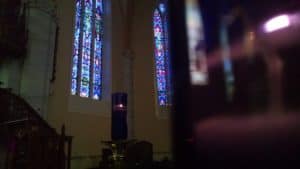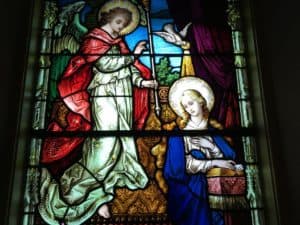Prepare for the Fourth Sunday of Advent with another collaborative Franciscan Gospel post. This weekly Sunday Gospel reflection and questions are written by Fr. Paul Gallagher, OFM. They are edited by Franciscan Sister of Christian Charity Sister Anne Marie Lom and Joe Thiel. The excerpts from the Sunday readings are prepared by Joe Thiel. If you would like to read or download the complete pdf with excerpts for your prayer, please click here: Franciscan Gospel Refection December 24 2017 Excerpts from the Lectionary for Mass for Use in the Dioceses of the United States of America, second typical edition © 2001, 1998, 1997, 1986, 1970 Confraternity of Christian Doctrine, Inc., Washington, DC. Used with permission. All rights reserved. No portion of this text may be reproduced by any means without permission in writing from the copyright owner. Please include this information when printing.
Photos: Holy Name Church, Sheboygan, WI and Franciscan Sisters of Christian Charity Motherhouse Holy Family Convent, Manitowoc, WI.
Luke 1:26-38
The angel Gabriel was sent from God to a town of Galilee called Nazareth, to a virgin betrothed to a man named Joseph, of the house of David, and the virgin’s name was Mary. And coming to her, he said, “Hail, favored one! The Lord is with you.” But she was greatly troubled at what was said and pondered what sort of greeting this might be.
Then the angel said to her, “Do not be afraid, Mary, for you have found favor with God. Behold, you will conceive in your womb and bear a son, and you shall name him Jesus. He will be great and will be called Son of the Most High, and the Lord God will give him the throne of David his father, and he will rule over the house of Jacob forever, and of his kingdom there will be no end.”
But Mary said to the angel, “How can this be, since I have no relations with a man?” And the angel said to her in reply, “The Holy Spirit will come upon you, and the power of the Most High will overshadow you. Therefore the child to be born will be called holy, the Son of God. And behold, Elizabeth, your relative, has also conceived a son in her old age, and this is the sixth month for her who was called barren; for nothing will be impossible for God.”
Mary said, “Behold, I am the handmaid of the Lord. May it be done to me according to your word.”
Then the angel departed from her.
Background
Luke’s community would have heard this text from a different perspective than that of most contemporary readers. People of that day believed that any man and woman left alone would eventually become sexually involved. Therefore, they believed that there was a constant need to protect a woman from being alone with men. Women were to be in the constant company of other women or children, or secluded in the inner rooms or courtyard of the house. It was the responsibility of the male family members to protect the women from men who might take advantage of a woman’s desire to have sexual relations.
Mary is described as “betrothed to Joseph.” Being betrothed was much more than the contemporary notion of being engaged. Typically, the women of both families would have met to negotiate and determine whether the two were suitable partners. Both families had to be reassured that this was a good arrangement for all, and that neither was taking advantage of the other family. The honor of both families was at stake. Once the women had agreed on the details of the arrangement, the patriarchs of both families would confirm the decision. The betrothal was a public acceptance of the proposed marriage agreement. While the couple did not yet live together, they and their families had entered a public covenant to be husband and wife. The groom then prepared a suitable place for his bride to live within the house of his family. The bride for her part prepared to leave the house of her father and move to become part of the household of her groom. But before the bride moved from the house of her father to the house of the groom, she was expected to produce evidence of her virginity. If she could not, public shame was brought to both families.
When Luke’s community heard this text, they would have immediately been aware that Gabriel, a male spirit, was present to Mary without supervision. This was a potentially dangerous situation. However, the honorable Gabriel first recognized Mary as a person of honor before God, and then moved to ease her fear. He addressed her, “Hail, favored one! The Lord is with you” (verse 29). The term “hail” carries the connotation that one should rejoice. Although Gabriel tried to reassure Mary that his presence was a sign of “favor with God,” it also meant that she was being asked to surrender her life to God’s service. Noah, Moses, Gideon and Samuel all had “found favor” with God. (Genesis 6:8, Exodus 33:12, Judges 6:17 and 1 Samuel 2:26.) Gabriel continued to try to reassure Mary that what was requested was God’s will for her. She was to understand that God is capable of doing what was being suggested. Mary was still greatly concerned. “How can this be…?”
The text suggests that Mary’s concerns might have been larger than this single issue. Gabriel suggested that the Holy Spirit would come upon her and overshadow her. Luke’s community would recall the cloud that overshadowed the tent when God spoke to Moses. They further understood this to mean that God would play the role of a traditional husband for Mary. He would “empower” her and “protect” her, two duties of a Middle Eastern husband. Mary’s words of acceptance, “Let it be done to me according to your word,” (Luke 1:38b) were a typical response when one conceded an argument. They may be translated “as you wish.” God had chosen to interact with Mary directly, bypassing the traditions where the parents had roles in the arbitration and protection of their daughter’s life and future. Gabriel departed, but Luke does not give any indication that Mary was at peace. In the next verses of Luke’s gospel, Mary goes off to visit her cousin Elizabeth. (Luke 1:39-56)
Reflection Questions
- Do you know people who you believe are among God’s “highly favored ones?”
- Where do you look to find the presence of God in your world today?
- Mary is described as a virgin living in the town of Nazareth in the region of Galilee, betrothed to a man named Joseph who is of the house of David. What do you think Luke is trying to communicate to those who will hear his gospel by this description?
- How did Mary’s life change after Gabriel left?
- If Mary’s “Let it be done to me according to your word” is more a statement of surrender than acceptance, what does that say to you about how God was working in Mary’s life, and in your life?
- Mary, from the moment of her conception, is preparing for the birth of the infant Jesus. From what you know of Mary’s life over the next nine months, is there any insight for you in how you are being made ready to become the dwelling place of God in your own life?
- Given the life of Mary and others that the Church looks upon as “highly favored,” do you desire to be among God’s “highly favored?”
- Can you take some time to talk with God about your own desire to be among God’s favored, or about how God might be inviting you to be the one who gives life and flesh to God’s desire to be present in our world, or about some other thought or feeling that arose within you as you heard this gospel?




